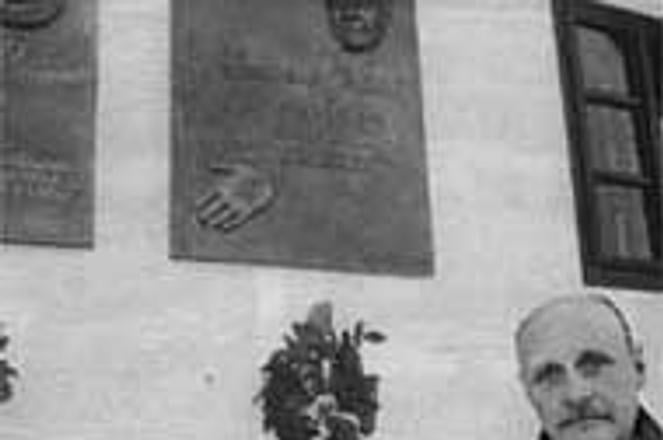Alexander Dubček: A man missed by his son (Pavol Dubček, right), by his country, by his world.Terry Moran
UHROVEC - Pavol Dubček, the son of arguably the 20th century's most famous Slovak, became so choked with emotion that he struggled to finish his speech in honor of his father. But the occasion - the dedication of the Alexander Dubček plaque and memorial room at the late Slovak leader of the 1968 Prague Spring's birthplace - merited the heavy emotional display. And for the son, politics would not spoil his father's day.
"I want my father remembered as the father of a family that misses him greatly," Pavol Dubček said. "This should be a tribute to Alexander Dubček the family man, not Alexander Dubček the politician."
While Pavol Dubček dwelt on his father's family values, Parliamentary chairman Ivan Gašparovič touched on how Alexander Dubček put Slovakia on the world map. "Slovakia has more often been an object rather than a subject of history," Gašparovič, a HZDS deputy, said. "But Dubček played a role on the world stage and pushed Slovakia onto that stage. Dubček's plaque differs from [Ľudovít] Štúr's only in the angle of the proffered hand from the heavens."
Ironically, Dubček's birth in this sleepy town of 1,600 people in western Slovakia, postdates the birth of Ľudovít Štúr, a Slovak pioneer who codified the country's language. Equally uncanny, both suffered house arrest, Dubček at the hands of the communist party for his role in the 1968 Prague Spring, and Štúr by the Hungarian monarchy for starting the Slovak National Movement.
And both died in accidents, Dubček when his car hydroplaned off the road September 1, 1992 as he was enroute to the then-Czechoslovak capital of Prague, and Štúr while deer hunting.
But while the causes for Štúr's untimely death has been laid to rest , the circumstances under which Dubček's life ended has raised many questions. The Slovak parliament voted in August to reopen an investigation into Dubček's death, but the Constitutional Court just ruled last month that parliament cannot establish investigative committees, thus cancelling, at least for the short-term, any probe into Dubček's death.


